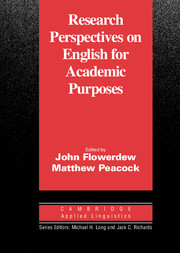Book contents
- Frontmatter
- Contents
- List of contributors
- Series editors' preface
- Preface
- I ISSUES IN ENGLISH FOR ACADEMIC PURPOSES
- II THE ENGLISH FOR ACADEMIC PURPOSES CURRICULUM
- Introduction to Part II
- 11 The EAP curriculum: Issues, methods, and challenges
- 12 Twenty years of needs analyses: Reflections on a personal journey
- 13 The curriculum renewal process in English for academic purposes programmes
- 14 Team-teaching in EAP: Changes and adaptations in the Birmingham approach
- 15 Does the emperor have no clothes? A re-examination of grammar in content-based instruction
- 16 The specialised vocabulary of English for academic purposes
- 17 Language learning strategies and EAP proficiency: Teacher views, student views, and test results
- 18 Issues in EAP test development: What one institution and its history tell us
- 19 Teaching writing for academic purposes
- 20 Reading academic English: Carrying learners across the lexical threshold
- 21 Incorporating reading into EAP writing courses
- 22 The development of EAP oral discussion ability
- 23 Second language lecture comprehension research in naturalistic controlled conditions
- 24 Designing tasks for developing study competence and study skills in English
- 25 Promoting EAP learner autonomy in a second language university context
- References
- Index
22 - The development of EAP oral discussion ability
Published online by Cambridge University Press: 05 October 2012
- Frontmatter
- Contents
- List of contributors
- Series editors' preface
- Preface
- I ISSUES IN ENGLISH FOR ACADEMIC PURPOSES
- II THE ENGLISH FOR ACADEMIC PURPOSES CURRICULUM
- Introduction to Part II
- 11 The EAP curriculum: Issues, methods, and challenges
- 12 Twenty years of needs analyses: Reflections on a personal journey
- 13 The curriculum renewal process in English for academic purposes programmes
- 14 Team-teaching in EAP: Changes and adaptations in the Birmingham approach
- 15 Does the emperor have no clothes? A re-examination of grammar in content-based instruction
- 16 The specialised vocabulary of English for academic purposes
- 17 Language learning strategies and EAP proficiency: Teacher views, student views, and test results
- 18 Issues in EAP test development: What one institution and its history tell us
- 19 Teaching writing for academic purposes
- 20 Reading academic English: Carrying learners across the lexical threshold
- 21 Incorporating reading into EAP writing courses
- 22 The development of EAP oral discussion ability
- 23 Second language lecture comprehension research in naturalistic controlled conditions
- 24 Designing tasks for developing study competence and study skills in English
- 25 Promoting EAP learner autonomy in a second language university context
- References
- Index
Summary
Introduction
Findings from research into effects of EAP instruction undertaken in one programme cannot be automatically assumed to generalise to others, given the powerful influence of learner variables such as cultural background and LI, and institutional constraints such as programme goals and resources, on the development of communicative L2 ability. At the least, research into the effectiveness of EAP instruction can serve as one component of an individual programme evaluation. This was the primary aim of the research we report on in this chapter. However, research findings may also prompt teachers and administrators in comparable EAP settings to ask similar questions, and embark on similar projects – one consequence we hope will follow from the research reported here.
We begin this chapter by summarising findings from previous EAP needs analyses that have focused on speaking requirements of university level students in a variety of settings. We then identify component skills contributing to a particular academic speaking task that emerges as important from this survey – small group discussion-relating these skills, where possible, to findings from SLA research. These include conversational management skills such as turntaking, as well as paralinguistic skills such as appropriate use of eye contact, gaze direction and gesture, all of which need to be integrated in successful performance of EAP discussion tasks. Following this we describe two dominant approaches to EAP course design, skill- and task-based approaches, and report the results of a one-semester effect of instruction study which operationalised skill and task-based approaches to developing EAP discussion ability in a Japanese university.
- Type
- Chapter
- Information
- Research Perspectives on English for Academic Purposes , pp. 347 - 359Publisher: Cambridge University PressPrint publication year: 2001
- 8
- Cited by



